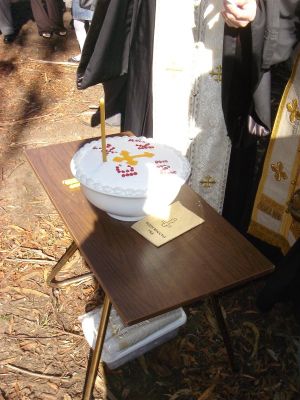|
From 'Orthodoxy and the World' www.pravmir.com Our Faith Source: St. Mary of Egypt Orthodox Church in America
(Saturday, 23 February 2008) - Contributed by Brantley Hobbs - Last Updated (Sunday, 09 March 2008)
We are having Saturday of Souls liturgies on the first two Saturdays of March. I am a recent convert and this is all new to me. What should I expect and what should I do? - Confused Soul
My dear confused soul; First of all it seems to me you need a nice hot cup of tea. Please do come sit with me and weíll talk about the upcoming Saturday of Souls liturgies. I think you will find it not so confusing after all.
- The most important thing you can do is to attend. Do not allow the busy world pull you away from these beautiful services. Tarry just a little to remember those who have gone before us to their rest. One day we each will welcome the prayers of the living and the departed when we too have fallen asleep in the Lord.
- We Orthodox are very serious that our Lord and Savior rose from the dead and trampled down death by death. The church militant (here on earth) and the church triumphant are joined together in worship of the Most Holy Trinity. Not only do we remember the departed by name in our own personal prayers but we as the Body of Christ remember them formally several times during the liturgy. Even in the Proskomedia the service before the liturgy where the offering (prosphora) is prepared - those faithful who have fallen asleep in the Lord are remembered as a morsel is placed on the diskos with the Lamb.
- We commemorate the saints on the day of their repose. I am always surprised by the look I get from people when they realize that St. Patrickís Day is the commemoration of the day the great Saint fell asleep in the Lord. It makes the green beer, leprechauns, and riotous behavior a little silly doesnít it? But how do we remember those of the faithful who are not commemorated as saints on specific days? We do so with a Panikhida and a Saturday of Souls liturgy.
- Saturday has traditionally been the day to remember the departed as it is the day the Lord descended into Hades. We do so in the faith and understanding that the prayers of the faithful living and departed have benefit all the way up to the final judgment. We intercede for one another.
- The Saturday of Souls is in the wisdom of the church placed very precisely. Look at where we are with the Lenten Triodion. The first Saturday of Souls liturgy is on the day before Judgment Sunday and the second on the eve of Forgiveness Sunday. It makes perfect sense, donít you think, for us to remember those who have gone before us specifically at these moments? The church in her wisdom thinks so.
- Prepare a list of the departed to give to the priest. Please check with him on how names of non-Orthodox will be handled. Usually the priest will have you bring it with you. Be sure and use full baptismal names and not nicknames.
- The church will also commemorate those whose names we do not know. The victims of tragedies, wars, natural disasters are precious in the sight of the Lord. He knows them all by name. We, while not able to remember them by name, do remember them and pray for them. That to me, my dear, is so important. Donít you think? No life should be drubbed out and forgotten. That would reap a harrowing despair.
- After liturgy will be the beautiful prayers of the Panikhida. Koliva (or Kutya as it is known in some places) will be offered during the Panikhida. It is placed in the nave not on the altar and usually there is a lit candle placed in the Koliva during the Panikhida. Now remember that the Panikhida is a prescribed service of the church. The Koliva is a custom in response to it. There are huge variations to how it is done but it is done in some way in all the Orthodox cultures.
- Koliva is usually boiled wheat or sometimes rice. In some cultures, bread is offered. In all these variations in custom, it includes a grain. That is important because the tradition of Koliva comes from a verse in the bible: "Unless a grain of wheat falls into the ground and dies, it remains just a grain of wheat. But if it dies, it produces much fruit." John 12:24. The Koliva is sweetened usually with raisins and honey (some will put a lot more into their Koliva including candies, Jordan almonds and other things, as a child those were always my favorite ones). It is to remind us that the Kingdom of Heaven is sweet where the bitterness and grief of death have passed away.
- After the Panikhida, the Koliva is blessed and then eaten by those in attendance in remembrance of the souls who have in faith fallen asleep in the Lord. You donít have to be Orthodox to share in the Koliva. Please eat some but be mindful. Even though this is an expression of a truth that varies among cultures, it is blessed. Do not discard the Koliva. Any left over will be buried or burned. Even the spoons and cups used for it will be collected separately and burned (just like the plates and foods at Pascha).
Now my dear, you seem much less a lost soul and more like one who will join with me on those special Saturdays to remember the souls of the servants who have fallen asleep.
With enveloping hugs; Baba
© Copyright 2004 by 'Orthodoxy and the World' www.pravmir.com |
